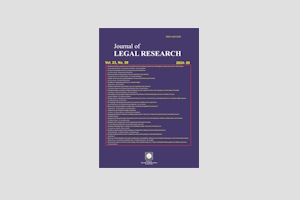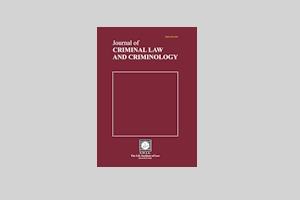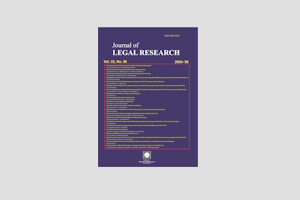Journal of
LEGAL RESEARCH
Number 27
Vol. XIV ● No. 1
Spring – Summer 2015
Managing Editor: Vahid Eshtiagh
Editor-in-Chief: Seyyed Ghasem Zamani
CONTENTS
Articles
Tension between Zonal and Global management in prevention and repression of criminal acts in sea
Djamchid Momtaz – Massoud Alizadeh – Shahram Zarneshan
Legal system governed on succeed obligation for merging Trade Companies
Bahram Hasanzadeh
Allocation of legislative jurisdiction of Parliament in the constitutional order of Iran
Javad Taghizadeh – Fatemeh Samieyan
A Comparative Study of Iran’s Criminal Legislative Policy With UNCAC in the field of Financial Anti-corruption and its Evolutions
Mohammad BagheriKomarolia
Open source software system
Sayyed Mohsen Tolou – Jafar Nezamolmolki
“The legitimacy of using force against Pirates off the coast of Somalia; emphasis on the necessity of observing international human rights considerations in exercise of jurisdiction”
Zakieh Taghizadeh
The procedure in extradition law with insist on Julian Assange’s cases
FaridAzadbakht – Mehdi TavanaeManesh
Structure and Efficiency of African Court on Human and People’s Rights
Seyed Yaser Ziaee -Sadegh Jafarzadeh Darabi
Bright Law in the Black Sea: Flexibility and Predictability of Maritime Delimitations Criteria in the ICJ’s Decision on Romania/Ukrain (2009)
Djamshid Mazaheri
A comprehensive legal challenge: Italy versus ICJ
Faraz shahlaei
Articles
Tension between Zonal and Global management in
prevention and repression of criminal acts in sea
Djamchid Momtaz
Massoud Alizadeh
Shahram Zarneshan
Abstract:
Nowadays, prevention and repression of criminal acts in different maritime zone are a great challenge for our international Community. But, the recent international Practice shows some tensions between State of flag jurisdiction and other states to pursue criminals, especially in high sea. As it is established in customary international law, states of flag have exclusive jurisdiction over their ships in high sea. But, recently, some powerful maritime nations have tried to influence these exclusive authorities. The main reason for them is to counter danger of terrorist activities. In this context, the resistance of some states resulted in a delicate situation in international legal order. This article, by analyzing the international practices during recent decades, tries to present legal solutions for this real conflict among different jurisdictions to counter serious crimes in international maritime zones.
Keywords:
Zonal and Global management,Terrorism, maritime zones, State Jurisdiction.
Legal system governed on succeed obligation for
merging Trade Companies
Bahram Hasanzadeh
Abstract:
Unfortunately, merging process and legal issues in Iran legal system hasn’t been resolved despite of the complexity on merging Trade Companies.
Merging companies results to mitigate cost and trade risks and to elevates productivity as well as managing concentration on capital market, and affects significantly on financial and economical affairs.so, knowledge to legal issues of merging is essential.
Although commerce law commits debts, obligation and assets of merging companies transfer to new company or integrative company, but transferring obligations or assets should be interpreted on a framework of general rules and principals.
The time for transferring of debts and obligations is significantly important, so “companies Registration Offices“ consider specifically on them.
Merging trade companies, the time of transferring obligations is too important. other issues to transfer obligations including asset exchanges, tax payments, assessment and account auditing.
Keywords:
Merge, commercial, corporation, state enterprise, transportation, commitments succession, capital blocking, 44 principle, Liability.
Allocation of legislative jurisdiction of Parliament
in the constitutional order of Iran
Javad Taghizadeh
Fatemeh Samieyan
Abstract:
The principle 71 of the Constitution of Islamic Republic of Iran has spoken of general jurisdiction of Parliament in legislation within appointed limits in the Constitution. However, some other principles of the Constitution have stated and identified the jurisdiction of laying down the rule of law for some Institutions. This sometimes indicates Parliament’s interference prohibition to these specific institutions’ rule making scope and sometimes also has created uncertainty of this prohibition. The rule making jurisdiction of the Assembly of Experts mentioned in the principle 108, the Guardian Council’s jurists mentioned in the principle 108 and The Guardian Council Institution mentioned in the interpretive theory No. 21934/30/16, the Expediency Council of Regime under the principle 112 and the interpretive theory No. 5318, are explicit and definite allocations on the general jurisdiction of Parliament. Despite the lack of explicit Constitutional legislator and some Uncertainties, it seems Parliament’s interference to the Government’s rule making scope in the principle 138 and Supreme National Security Council mentioned in the principle 176 is perfect.
Keywords:
Constitution, Legislation, Parliament, Jurisdiction
A Comparative Study of Iran’s Criminal
Legislative Policy With UNCAC in the field of
corruption and its Evolutions Financial Anti
Mohammad BagheriKomarolia
Abstract:
Corruption has a complex nature with a vast and divers of effect. This phenomenon results in the decline in investment and economic growth, distortion of the expenditure patterns of government, increase in the gap among different income groups and inequality. Moreover, it destroys collective consciousness, reduces the legitimacy and creditability of government and in a general terms it damages economic, social and cultural pillars of communities
For tackling this rampant malice, all aspects and features of corruption should be identified. Thenhaving found an extensive and exclusive definition its favourable grounds and reasons should be looked in to and approaches to fight against it should be recognized by other countries and considering national as well as international capacities Criminal policy is considered as a significant measure for preventing and fighting against crimes and abuses which follow diverse models in different communities
Legislative criminal policy is one of the most influential measures acceptable by most political systems. In this paper efforts have been made to reiterate that corruption is resulted from the abuse done by individuals (in both private and public sector) due to the defect or lack of sufficient sanction provided by laws with this supposition that Iran, s legislative criminal policy has not been developed based on the advancement of its bureaucratic system as well as national, economic and social activities
For the purpose of proving this supposition, rules and regulations governing the fight and prevention of corruption including constitutional and ordinary ones have been reviewed and ambiguities and loopholes in this respect have been analyzed
Keywords:
Financial Corruption,Criminal Legislative Policy,Crime, UNCAC
Open source software system
Sayyed Mohsen Tolou
JafarNezamolmolki
Abstract:
The open source system is an approach towards free development and expansion of softwares. By the end of 1990s, in reaction to creation of monopoly in software production by the intellectual property system, this approach came into existence. Free transfer of source code along with its software and the possibility of free reproduction, distribution, modification and redistribution of the modified version are among the basic principles of this approach. The ten principles of open source system are in contrast with the principles governing intellectual property system.
Academic licenses, reciprocal and standard, are the most widely used open source licenses. Another principle is the option of software commercial exploitation by way of open source licenses. According to the advantages of open source system in protecting softwares, it is required some modifications in intellectual property principles affected by open source roles.
Keywords:
Open source, intellectual property, systems, source code, license
JEL classification: K39, L86, O34
“The legitimacy of using force against Pirates off
the coast of Somalia; emphasis on the necessity
of observing international human rights considerations
in exercise of jurisdiction”
Zakieh Taghizadeh
Abstract:
Piracy and armed robbery against ships at seas off the coast of Somalia, the Hornof Africa, Gulf of Aden and recently the Gulf of Guinea in West Africa have been at the forefront of the attention paid by the international community and specifically the United Nations Security Council to the serious crisis posed against international trade, security and safety of maritime navigation. In this regard, UNSC resolutions have already expanded the narrower scope of international law on piracy so that the international community tempted to fight against piracy and armed robbery against ships at sea extensively by applying all necessary instruments. However, such measures of using of force according to the UNSC resolutions should be carried out based on the international human rights law and international humanitarian law to be considered legitimate. Furthermore, in these resolutions, UNSC urges all States and international organizations involved in fighting against piracy to establish an international cooperation mechanism as a common point of contact for counter-piracy activities near Somalia, and to enhance the judicial capacity of regional states to combat piracy, including the judicial capacity to prosecute pirates. This article aims to investigate about the legitimacy of using force against pirates off the coast of Somalia and the Gulf of Aden, firstly based on an inquiry about the international human rights law considerations (in particular guarantees to a fair trial, prohibition of torture and inhuman and cruel treatment during the exercise of jurisdiction over pirates) and secondly a study on the practice of the European Court of Human Rights (ECHR) and the International Tribunal for the Law Of the Sea (ITLOS).
Keywords:
Piracy, Use of Force, Human Rights Law, Humanitarian Law, Guarantees
to a fair trial, UN Security Council Resolutions.
The procedure in extradition law with insist
on Julian Assange’s cases
FaridAzadbakht
Mehdi TavanaeManesh
Abstract:
Despite of the previous procedure in regard of extradition’s law which the authorities’ political profits had determined role in its status, in the new international order in order to activateextradition’s process, we need inevitably to consider two approaches; law and morality which can be recognized as law approach and enforcement law approach. In some cases like Julian PaulAssange, the extradition’s process is affected by political interests of some countries. In this essay we are going to present a short history of extradition and explain the two mentioned approaches with regard to Julian Assange’s case, the founder of WikiLeaks, and via his functions and the approaches we will analyses his charges in the law level and Sweden and England governments’ liabilities in enforcement law level.
Keywords:
Law approach, enforcement law approach, Julian Paul Assange,
WikiLeaks, United States of America, England, Sweden
Structure and Efficiency of African Court
on Human and People’s Rights
Seyed Yaser Ziaee
Sadegh Jafarzadeh Darabi
Abstract:
Because of poverty, the main problem of African people is focusing on second generis of human rights. However constitution of African Court on Human and People’s Rights in 2006 besides African human rights commission could improve promotion of all human rights in Africa Continent. There were some problems from outset of constitution of the Court like financial sources, reluctance of States for approving the Constitution and some restrictions in jurisdiction of the court. These problems caused to a suggestion for merging of the Court and African court of justice. So a protocol has been signed but it’s not obliging yet. Restrictions in the Court for compulsory proceeding to claims of African citizens and NGO’s caused to low efficiency of Court for preserving human rights and low quantity of cases which have been proceeded.
Keywords:
African commission on human rights, African human rights court,
protocol on establishment of human rights court of Africa, African
court of justice and human rights.
Bright Law in the Black Sea: Flexibility and
Predictability of Maritime Delimitations Criteria in
the ICJ’s Decision on Romania/Ukrain (2009)
Djamshid Mazaheri
Abstract:
On 3 February 2009, international court of justice rendered its judgment on the merits in the case concerning maritime delimitation in the black sea between Romania and Ukraine. The judgment of the court is important in some aspects concerning three stages of structure of the establishment of the maritime boundary, interpretation of articles 74 and 83 of UNCLS by the court, new direction of the court toward the corrective-equity approach and finally legal situation of Serpent‘s island and the interpretation of article 121(3) of UNCLS by ICJ. This article provides detailed analyses of the mentioned issues.
Keywords:
Law of the Sea, International Court of Justice, 1982 Convention, Maritime Delimitation, Equity, Black Sea
A comprehensive legal challenge: Italy versus ICJ
Faraz shahlaei
Abstract:
In 2012 the dispute between Germany and Italy,ICJ endorsed the jurisdictional immunity of States and their properties against any legal challenges by other States and recognized Italy’s responsibility for allowing civil claims based on violations of international humanitarian law, to be brought against the Federal Republic of Germany. The court based its decision on international customary law and the relevant procedure of States. But this was not the end since on 2014 Constitutional Court of Italy declared this judgment in conflict with Italian constitution and paved the way for future civil claims against Germany of any other State based on breaching Jus Cogens and fundamental principles of Human Rights. The Constitutional Court grounded its decision on recent changes in customary international law saying that the previous custom has changed during recent years and a new set of rules created a new custom in this regard. In this paper we analyze different aspects of this legal confrontation which can potentially undermine one of oldest and most important principles of international law and overthrow traditional frameworks of international law environment. The creation of a new custom concerning State immunity and the current challenge following the recent judgment of Italian Constitutional Court is also discussed.
Keywords:
State immunity, international customary law, Jus Cogens, legal jurisdiction, international court of justice, Italian constitutional court





